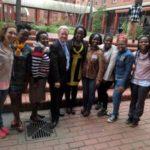The 2016 African School on Internet Governance (AfriSIG) provided a platform for discussion of issues relating to internet governance. The beauty of the school is pegged on the diverse nature of the participants drawn from different countries and from fields that include civil society, academia, the technical community and the government. With mottled experience drawn from different contexts coupled with a mix of dissimilar social and technical backgrounds, participants gear for an explosive learning curve. Through exchanges between participants during the course of the school, they… Read more
AfriSIG 2016
Ma participation à l’École Africaine sur la Gouvernance de l’Internet 2016 : Un exercice pratique inoubliable.Jean Paul Nkuruziza
Du 11 au 15 Octobre 2016 à Durban en Afrique du Sud, j’ai eu l’occasion de participer à l’École Africaine sur la Gouvernance de l’Internet, organisée par APC (l’Association pour le Progrès des Communications), en collaboration avec le NEPAD (Nouveau Partenariat pour le Développement de l’Afrique).
Au programme de cette session d’éducation et de renforcement de capacités en matière de Gouvernance de l… Read more
Gbenga SesanGbenga Sesan, executive director of Paradigm Initiative Nigeria, joined this year’s African School on Internet Governance as a member of the faculty team, and highlighted the contribution it is making to capacity building on internet governance in the region.
APCNews: What is your general impression about the school?
Gbenga Sesan: The school is an important part of the capacity- building process to get more African civil society actors more knowledgeable about internet governance… Read more
The right to freely express oneself is a fundamental right. Article 19 of the Universal Declaration of Human Rights” states: _“Everyone has the right to freedom of opinion and expression; this right includes freedom to hold opinions without interference and to seek, receive and impart information and ideas through any media and regardless of frontiers.”
The Internet is a new platform for women in Africa to engage freely. However, this freedom has been stifled by online violence against women, manifested in cyberbullying, threats online, body shaming, “revenge porn”,… Read more
Shortly after this year’s African School on Internet Governance (AfriSIG) was held, the 5th African Internet Governance Forum (AfIGF) took place from 16 to 18 October at the Durban International Convention Centre. The South African government was the host government for the AfIGF, and arguably this year the government of South Africa has made significant strides in participating in multistakeholder settings in relation to internet governance locally and regionally. Prior to AfriSIG and the AfIGF, South Africa had its… Read more
AFRINIC is home to Africa’s regional internet registry, based in Mauritius, and has three other operational offices in South Africa (technical operations), Egypt (backup and disaster recovery) and Ghana (training coordination).
AFRINIC was part of the 2016 African School on Internet Governance (AfriSIG) session on “Multistakeholder internet governance: Achievements, strengths and weaknesses”, where it’s CEO Alan Barrett, stated that multistakeholderism is important to the future of internet governance and AFRINIC believes in this process.
Afrinic CEO “Alan Barrett… Read more
This year’s African School on Internet Governance included a practicum exercise coordinated by Avri Doria, a highly respected member of both the internet technical community and the global internet governance community, as well as an APC member and volunteer. APCNews spoke with Avri to gather her insights on this year’s edition and on AfriSIG in general.
APCNews: What is your general impression about the 2016 AfriSIG?
Avri Doria: This AfriSIG was amongst the better experiences I have had in teaching in SIGs… Read more
David SouterDavid Souter is a longstanding associate of APC, and has worked for more than 20 years on the relationship between information and communications technologies (ICTs) and public policy, particularly in the areas of development, the environment, governance (including internet governance) and rights. He joined this year’s edition of the African School on Internet Governance (AfriSIG) as a faculty member, focusing on the relationship between internet governance and human rights.
APCNews: What type of role would the internet play in achieving… Read more
AFRINIC is home to Africa’s regional internet registry, based in Mauritius, and has three other operational offices in South Africa (technical operations), Egypt (backup and disaster recovery) and Ghana (training coordination).
AFRINIC was part of the 2016 African School on Internet Governance (AfriSIG) session on “Multistakeholder internet governance: Achievements, strengths and weaknesses”, where it’s CEO Alan Barrett, stated that multistakeholderism is important to the future of internet governance and AFRINIC believes in this process.
… Read more
Chenai Chair, researcher and communications/evaluations officer at Research ICT Africa, was an AfriSIG participant and graduate of the 2015 edition. This year, however, she became a member of the faculty, and did a spectacular job as team coach, assisting Avri Doria in the practicum sessions. In this interview, she shares her insights from that new position.
APCNews: How did you generally find this edition of AfriSIG?
Chenai Chair: I found this year’s AfriSIG a class full of young people ready to learn about internet… Read more










